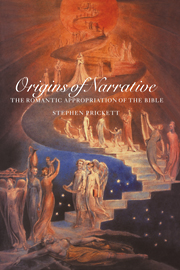Book contents
- Frontmatter
- Contents
- Preface
- Acknowledgements
- Introduction
- PART I JACOB'S BLESSING
- PART II THE ROMANTIC BIBLE
- 3 The Bible as novel
- 4 The Bible and history: appropriating the Revolution
- 5 The Bible as metatype: Jacob's ladder
- 6 Hermeneutic and narrative: the story of self-consciousness
- Epilogue
- Bibliography
- Index
5 - The Bible as metatype: Jacob's ladder
Published online by Cambridge University Press: 06 November 2009
- Frontmatter
- Contents
- Preface
- Acknowledgements
- Introduction
- PART I JACOB'S BLESSING
- PART II THE ROMANTIC BIBLE
- 3 The Bible as novel
- 4 The Bible and history: appropriating the Revolution
- 5 The Bible as metatype: Jacob's ladder
- 6 Hermeneutic and narrative: the story of self-consciousness
- Epilogue
- Bibliography
- Index
Summary
SCHLEIERMACHER, HERMENEUTIGS AND JENA ROMANTICISM
In Germany, the impact of the French Revolution had led to a quite different appropriation of the past from that of either England or France. If the higher criticism of Reimarus, Lessing and Eichhorn had already created by the latter part of the eighteenth century a historicist perspective on the Bible that in many ways pre-dated that of Volney in France, the revolutionary Romanticism of the Jena circle was to lead towards a new hermeneutical approach to the scriptures. Unlike Chateaubriand, whose rereading of the history of Christianity was motivated primarily by a desire to preserve the status quo, this version of Romanticism was from the very first both radical and theoretical.
The reasons were in part intellectual, in part political. Though France had created the Revolution as a political fact, there is a sense in which the idea of revolution was created and sustained by Germany long after the event itself had passed into history. There, as nowhere else, the idea of revolution was generalised and philosophised. In spite of peasant revolts in Saxony and Silesia and the annexation of the Rhineland to France, by popular petition, the political impact of the Revolution had been relatively slight. The lack of political unity or any common social issues between the three hundred or so German states, meant that from the first the French Revolution was experienced more as a state of mind than as a political option.
- Type
- Chapter
- Information
- Origins of NarrativeThe Romantic Appropriation of the Bible, pp. 180 - 221Publisher: Cambridge University PressPrint publication year: 1996



